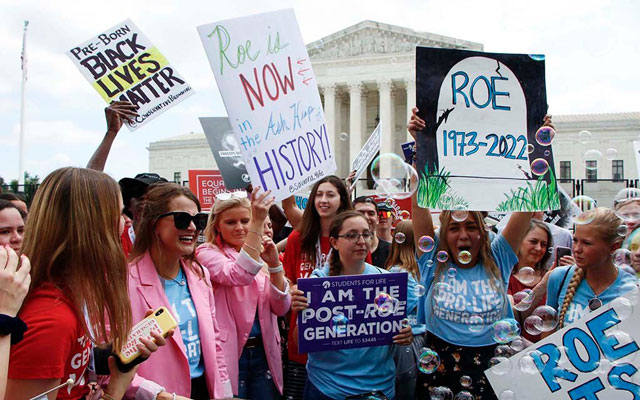File Photo By Neetish Basnet/Cronkite News: Abortion forms rejoiced outside the Supreme Court in June, when the court overturned its ruling in Roe v. Wade, the landmark 1973 decision that recognized a right to an abortion. An Arizona judge ruled Friday that, in light of the high court’s ruling, a 1901 state law criminalizing abortion in most cases should be reinstated.
By Haley Smilow/Cronkite News
TUCSON – A Pima County judge ruled Friday that a near-total ban on abortions in Arizona is back in effect, lifting a 50-year-old injunction that became moot after the U.S. Supreme Court this summer reversed its Roe v. Wade decision.
The ruling by Superior Court Judge Kellie Johnson came just hours before a state law that would have allowed abortions up to 15 weeks of pregnancy was set to take effect in Arizona.
The 1901 law that she revived makes it a crime, punishable by up to five years in prison, to perform an abortion or take any action “with intent thereby to procure the miscarriage of such woman, unless it is necessary to save her life.”
Abortion-rights advocates had urged Johnson last month to keep the injunction in place, saying the 1901 ban would lead to confusion for health workers and prosecutors, and upend nearly 50 years of law that recognized abortion as a “legal, medical procedure.”
But in a ruling delivered late Friday afternoon, Johnson said that modifying the injunction as advocates wanted her to do was not “procedurally or legally appropriate.”
“The Court finds that because the legal basis for the judgment entered in 1973 has now been overruled, it must vacate the judgment in its entirety,” Johnson wrote. “The Court finds an attempt to reconcile fifty years of legislative activity procedurally improper in the context of the motion and record before it.”
Abortion-rights advocates were quick to condemn the ruling and promise to fight it.
“Today’s ruling by the Pima County Superior Court has the practical and deplorable result of sending Arizonans back nearly 150 years,” said a statement from Brittany Fonteno, president and CEO of Planned Parenthood Arizona. “No archaic law should dictate our reproductive freedom and how we live our lives today.”
Planned Parenthood said in a tweet Friday evening that because of Johnson’s ruling it “has been forced to pause abortion services, to protect our providers and patients.”
But Arizona Attorney General Mark Brnovich, who had argued that there is no reason to keep the injunction imposed by Roe, now that Roe has been overturned, said Johnson made the right call.
“We applaud the court for upholding the will of the Legislature and providing clarity and uniformity on this important issue,” Brnovich said in a statement shortly after the ruling was handed down.
Johnson’s order is the latest fallout from the Supreme Court’s ruling this summer that reversed Roe v. Wade, the landmark 1973 decision that recognized a right to an abortion. In June, the court ruled in Dobbs v. Jackson Women’s Health its previous reasoning in Roe was “egregiously wrong” and that it should be left to state lawmakers to decide whether abortion should be legal.
Since Dobbs, at least 14 states have instituted a total ban on abortion, with some states passing “trigger laws” to enact a ban when the court overturned Roe. Other states, like Arizona, have been left grappling with what laws should be enforced once Roe was reversed.
In the immediate aftermath of Dobbs, Brnovich initially said the 15-week limit that passed this year and was set to take effect Saturday would be the law of the land. He later reversed himself, however, and said the 1901 ban still stood and would take effect again as soon as the injunction was lifted.
A Brnovich spokesperson defended that position in August, saying in a statement that state lawmakers have “consistently reaffirmed our existing law prior to Roe v. Wade, most recently the legislation passed by lawmakers and signed by the government earlier this year.”
That was echoed Friday by Johnson’s order.
“Significantly, when passing laws concerning abortion when Roe v. Wade was law, the Legislature repeatedly disclaimed that the statutes it enacted were creating a right to an abortion,” she wrote.
Clinics in Arizona, uncertain about the law after Dobbs, briefly suspended all abortion procedures in the state, while providing other family planning and OB/GYN services. Several began reoffering abortions, however, while the legal challenges worked themselves out. By the first of this month, at least five clinics, in Phoenix, Tempe, and Tucson, had resumed abortions.
Johnson’s ruling now criminalizes abortions in the state, a move welcomed by anti-abortion groups.
“Arizona’s abortion law effectively affirms that life is a human right and should not be sacrificed unless the mother’s life is at risk,” said a statement from the Center for Arizona Policy. “Judge Johnson rightly lifted a 1973 injunction on Pima County.”
Pima County Attorney Laura Conover, who filed a brief in support of the Planned Parenthood challenge to Brnovich’s motion to lift the injunction, said she was “obviously very disappointed” by the ruling.
“We were hoping for a different result, and we will be looking at available legal remedies. My priorities as Pima County Attorney are public safety and health,” Conover’s statement said.
In her ruling, Johnson said Planned Parenthood, whose challenge of the abortion ban on constitutional grounds in the early 1970s led to the injunction, can take new legal action to challenge the law anew. That’s what Fonteno said it plans to do.
“This is not the end of the fight, this harmful ban has no place in Arizona, and we will persist until that is achieved,” Fonteno’s statement said.










